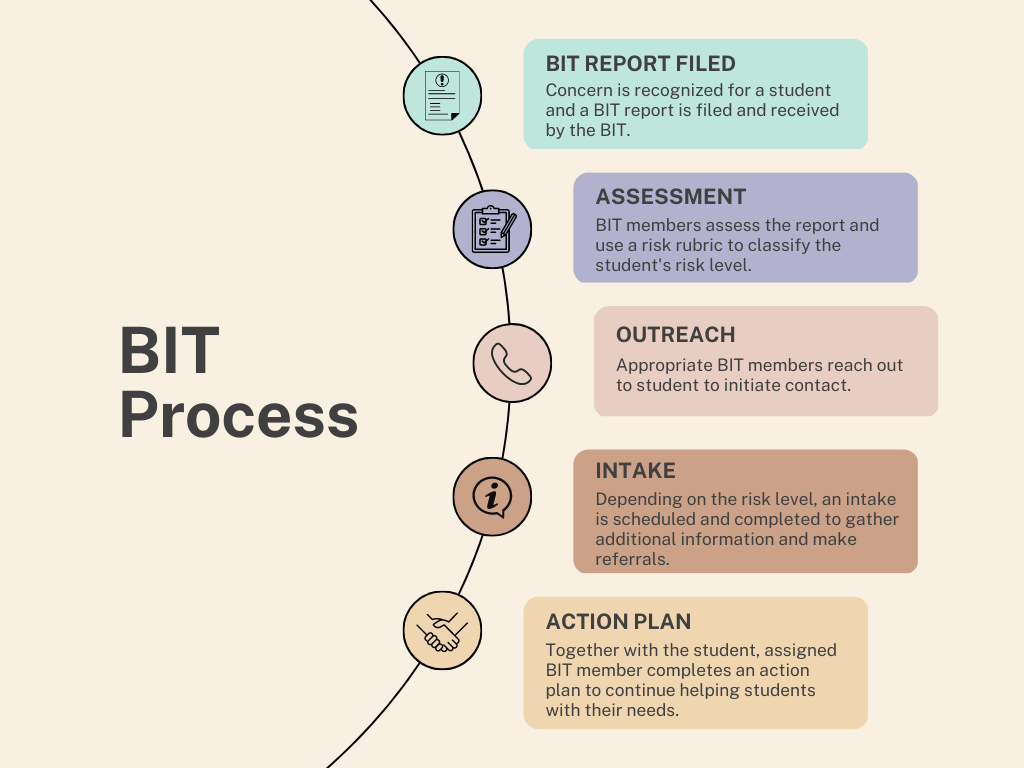BIT: Behavioral Intervention Team
The Behavioral Intervention Team, or BIT, is a team of staff who work directly with struggling students. The BIT process is designed to identify members of the Indiana Tech community who need support, guidance, or other intervention and to refer them to appropriate campus and community resources. The BIT process identifies the potential for disruptive conduct, self-harm, and the risk of violence to others. The BIT comprises campus counselors, the SAMHSA coordinator, the Title IX coordinator, security, OSS, and residence life representatives.
The BIT adheres to the standards set by the National Association for Behavioral Intervention and Threat Assessment (NABITA). You can learn more about NABITA here.

Who are BIT members?
There are two people who serve on the BIT from student affairs: Jozy Garrison and Chris Dickson.
Jozy Garrison’s role as the BIT administrator is to receive, review, and assign all BIT cases.
Chris Dickson’s role in the BIT is to follow up on conduct and Title IX related concerns when present in a BIT report.
There are three counselors who represent Indiana Tech’s Counseling Clinic. Each of these counselors play an important role in the BIT. For each BIT case, a counselor is assigned to initiate contact with the reported student. Counselors will complete intakes, provide counseling, and make outside referrals when needed.
There are two BIT members representing Indiana Tech’s Security office. Devin Blackford and Julie Rourke are the director and manager within the Security office. They serve on the BIT to provide safety measures as needed. These measures come into play when a student is displaying aggressive or harmful behaviors to ensure everyone’s safety.
Two members join us from the Office of Student Success. Kris Bliss serves as the VP of OSS and Angela Williams is the Accessibility Coordinator. Kris and Angela are key members to the BIT by connecting students to services provided by OSS and assisting with accommodations as needed.
Two members from the Residence Life office are BIT members, Director Jesse Brown and Coordinator Drennan Sorrell. Their role within BIT is to assist with wellness checks as needed and provide extra points of contact with reported students.
File A BIT Report
Not sure if you should file a report? Below are the behaviors that could identify a mental health concern.
- Decline in performance
- Excessive class absences
- Inconsistent effort
- Decline in class participation
- Decline in submitting assignments
- Anxiety or depression signs
- Disruptive behaviors
- Emotional outbursts
- Flat affect
- Reduction in emotional expressiveness
- Rapid change in mood or behavior
- Self injurious behaviors
- Altered eating; eating less/more, participating in extreme diets
- Excessive exercising
- Sleeping too much or too little
- Adjustments concerns
- Arrests or legal issues
- Conflicts with others
- Dating or domestic conflicts
- Death of a family member
- Death of a fellow student or friend
- Financial concerns
- Harassing or stalking behaviors/concerns
- Hunger/Food insecurity
- Illness of a family member or friend
- Medical concern or emergency
- Sexual assault victim
- Substance abuse
- Expressing thoughts of suicide
- Talking about wanting to die
- Expressing guilt, shame, or being a burden to others
- Displaying or expressing feelings of hopelessness, extreme sadness, unbearable emotional or physical pain
- Making a plan or researching ways to die
- Withdrawing from friends
- Giving away important items, making a will, or saying goodbyes
- Taking dangerous risks
- Extreme mood swings
- Increase in alcohol or other substances
Noticing these concerns? File a report below.
Assessment
Following NABITA’s standards, an assessment is made on every BIT report using the Risk Rubric. Reports are then classified, and appropriate outreach is made.